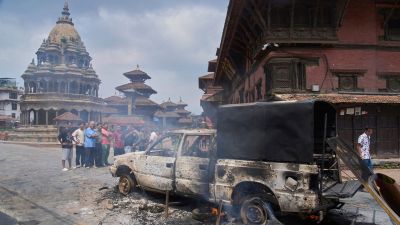CCTV alone not a solution,say experts
On August 6,almost a week after the low-intensity blasts,Deputy Chief Minister Ajit Pawar had announced that Rs 30 crore will be provided for installation of CCTVs in Pune and Pimpri-Chinchwad.
On August 6,almost a week after the low-intensity blasts,Deputy Chief Minister Ajit Pawar had announced that Rs 30 crore will be provided for installation of CCTVs in Pune and Pimpri-Chinchwad. The Pune Guardian Ministers move was a pointer to the importance CCTV has gained in crime detection.
After the German Bakery blast,Cantonment Police Station too had raised the need for CCTVs in Pune cantonment. Since October 2011,the Pune Cantonment Board (PCB) has been in the process of acquiring 16 CCTV cameras for M G Road,Fashion Street and Shivaji Market areas. Incidentally,a tender that was floated was withdrawn in October 2011 and another was never floated.
Although CCTVs are being perceived as a single-point solution to counter terrorism and theft,experts say that the way CCTVs are installed in India,they are far from helpful.
Former security advisor to RBI Maj Gen (Retd) Soli Pavri his vision paper on security of RBI had won appreciation from the RBI Governor said,Our approach to security is reactive which should ideally be predictive. CCTV is helpful after the crime. It is in no way a crime prevention gadget. It is wrong to assume your city is 100 per cent safe because you have installed CCTVs. It is helpful on premises such as municipal corporations and airports where controlled movement of population is monitored. But in cities,especially,if we are installing them to counter terrorism,I doubt how much it can help given that a terrorist who is willing to die is not bothered about whether he is being photographed or not.
Pavri advocates CCTV surveillance backed by strong database and monitoring network; and recommends next-generation CCTVs with predictive scanning technology much like the Automatic Number Plate Reader (ANPR) in cameras abroad. These cameras can scan a number plate and find out information about the vehicle entering the premises.
But for that,we need a standard size/format of the number plate. Besides,there needs to be a central database. Thus,as per requirement,the whole system needs to be standardised. But in India where is the control room,the human resource and training resources? No one seems to be thinking about these points in India, said Pavri.
The market offers a wide range of CCTVs costing from Rs 1,400 to 2.5 lakh. The technological aspect of installing a CCTV is neglected in India,says Rohit Joshi,director,Inspyre Technologies. Instead of looking at CCTV as an important monitoring tool,people look at it in terms of cost. They do not prefer CCTVs with technical specifications matching the area to be monitored and instead tend to go for cheaper models with lower resolution,sometimes of Chinese or Taiwanese make, said Joshi.
Installing a CCTV is a specialists job. It requires a security advisor to decide where and how to install a CCTV. In India,CCTV installation industry is disorganised. Here electricians advise people how to install them. Maintenance is another neglected area. Weather/dust proofing,maintenance are not given a thought even in many government contracts for CCTV installations, said Joshi. A retired Army officer said,In no way can CCTVs replace human/security intelligence. Security is participative.
Bus-stands still wait for CCTVs
The Central Railway has installed 36 CCTVs at the Pune railway station,but the three key MSRTC bus-stands at Pune station,Shivajinagar and Swargate are still without CCTVs. MSRTC officials had promised to install CCTVs after the German Bakery blast after it was revealed that blast suspects had brought explosives from Udgir in a state transport bus. MSRTC officials said they have sent their proposal and are awaiting intimation from the head office. Meanwhile,the PMPML has said it has urged the PMC to install CCTVs at its major bus-stands like the ones at PMC headquarter,Swargate,Deccan and Shivajinagar bus-stands.







